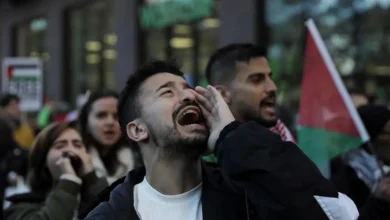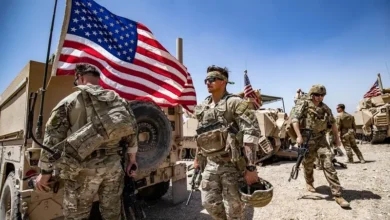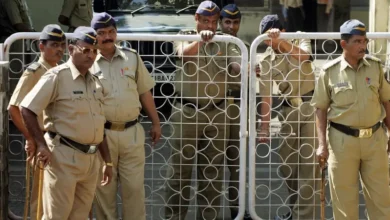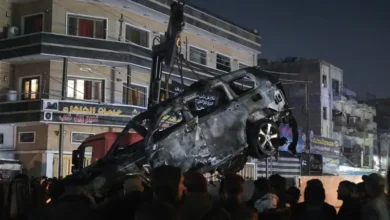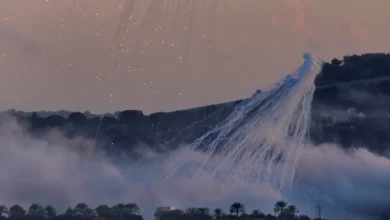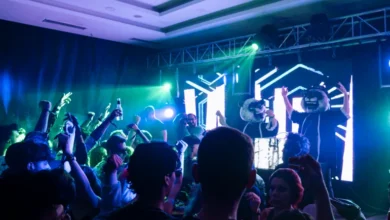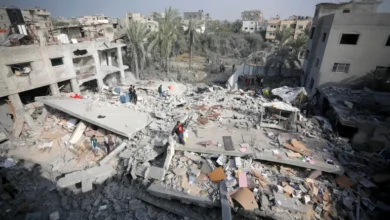‘We’ll have more’: Palestinians in Lebanon lay killed Hamas leader to rest
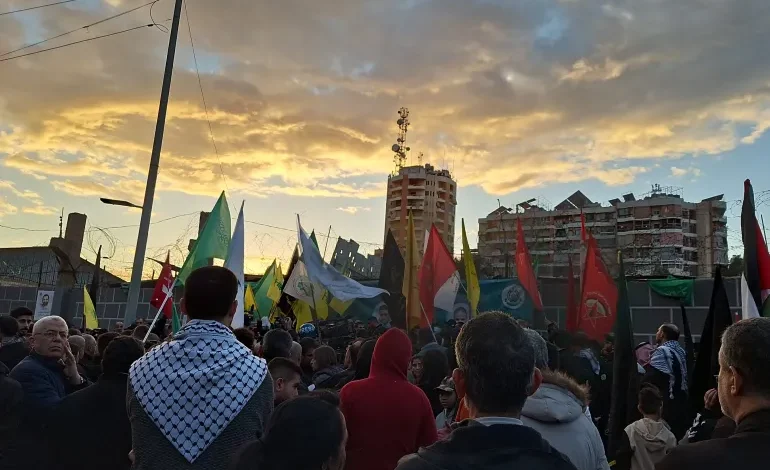
As Saleh al-Arouri’s coffin was laid to rest in Martyrs Cemetery in Shatila refugee camp in Lebanon’s capital, an elderly man saw a familiar routine play out.
“In every period of Palestinian history, we have leaders that rise up and then die. We’ll have more in the future. It’s cyclical,” said the man, who did not disclose his name.
Al-Arouri was Hamas’s deputy commander and the group’s most senior figure to have been killed since the start of Israel’s war on Gaza on October 7. More than 23,000 Palestinians in Gaza have been killed since then.
Israel has not formally taken responsibility for the drone attack in a densely populated area controlled by the Lebanese armed group Hezbollah on Tuesday night, in which al-Arouri was killed. But the country’s intelligence chief recently promised to kill every fighter that was involved in Hamas’s surprise attack on Israeli military outposts and communities on October 7, 2023. And analysts say the Beirut attack bears telltale signs of an Israeli operation.
Al-Arouri was one of seven people killed, which included at least two other Hamas officials and two members from Jama’a Islamiya, a Lebanese party tied to the Muslim Brotherhood.
All were celebrated as martyrs at al-Arouri’s funeral.
“May God protect [them]. Arouri is a martyr,” said Somaya al-Faour, 55, a Palestinian woman living in south Lebanon. “Palestinians have lived through so many Israeli massacres in Lebanon and in Gaza. But God gives us dignity when we die.”
Al-Faour was among thousands of Palestinian refugees who attended the funeral to mourn al-Arouri, on transportation arranged by Hamas and other political factions.
Somewhere between 250,000 and 300,000 Palestinians live in Lebanon since their parents and grandparents were uprooted from their land during the creation of Israel in 1948 – an event referred to as the “Nakba” or catastrophe.
At the funeral on Thursday evening, many among them promised to never give up their aspiration or fight to return home.
‘We all die’
Palestinian men, children and women described al-Arouri as the latest national figure to pay the ultimate price to advance their national struggle. Mohamad Ali, 17, said that he even dreams of growing up to emulate al-Arouri’s life.
While speaking to Al Jazeera at the funeral, Ali stood next to his friend wearing a Palestinian keffiyeh, a black handkerchief and holding the flag of Jama’a Islamiya.
“Al-Arouri is an example to all young Palestinians,” he said. “We need to grow up and be just like him.”
Ali acknowledged that Palestinian youth have few opportunities in Lebanon due to the endemic legal discrimination that they face. Palestinians are barred from working in 39 highly skilled professions, owning real estate and improving the conditions in refugee camps, where most people live in barely habitable and densely confined spaces.
Ali was born in Ein el-Hilweh, the largest Palestinian refugee camp in Lebanon where violent clashes often erupt due to turf wars between rival factions. It’s also where 80,000 people live – squeezed together – on 1.5 square kilometres.
While Ali is still growing up, he said that life was short and that he wanted to give his life to the Palestinian cause, if he could.
“In the end, we will all die. But I wish to be martyred,” he told Al Jazeera.
Zachia Abde, an elderly Palestinian woman from Shatila, stressed that Hamas fighters are part of the Palestinian community and that they cannot be eradicated, regardless of Israel’s military goals in Gaza.
“Israel and America call Hamas terrorists. But we think they’re terrorists,” she told Al Jazeera. “We know Hamas. Hamas comes from us [the Palestinian people].”
‘His life wasn’t easy’
As the celebratory gunfire quieted down, Wael Abdel-Rahman, who described himself as a Hamas fighter, told Al Jazeera that al-Arouri’s life – like his death – was a tragedy, even though he advanced the Palestinian cause.
He referenced the 20 years that al-Arouri spent in Israeli jails before he was finally released in 2007. Al-Arouri then spent the rest of his life in exile, first in Syria, Turkey and then Lebanon.
“He didn’t see his family for so long and now he’s a martyr,” Abdel-Rahman, 42, said. “His life wasn’t easy, but we all want to die like him.”
Abdel-Rahman added that he was training with Hamas in Lebanon and that he wants Hezbollah to expand its war with Israel, even though most Lebanese civilians would prefer not to be dragged into a wider regional conflict. However, Hezbollah has reportedly pulled back its fighters a few kilometres from its southern border with Israel.
Sources in the Palestinian camps told Al Jazeera that Hamas is still recruiting in case of an escalation. Abdel-Rahman said that many of his peers regard the group as the face of Palestinian resistance, regardless of how they are portrayed in the West.
“I don’t want to comment about how we are seen,” he told Al Jazeera. “God knows who is right and who is wrong in this conflict.”

